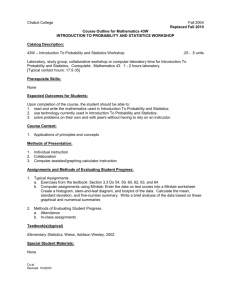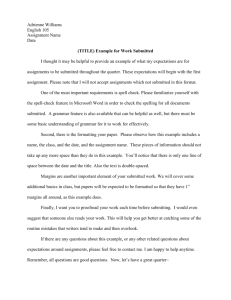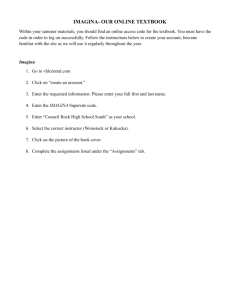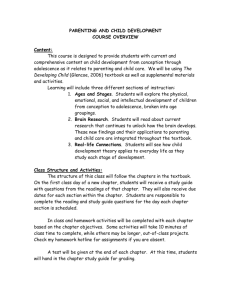Abbrev Syllabus FS12
advertisement
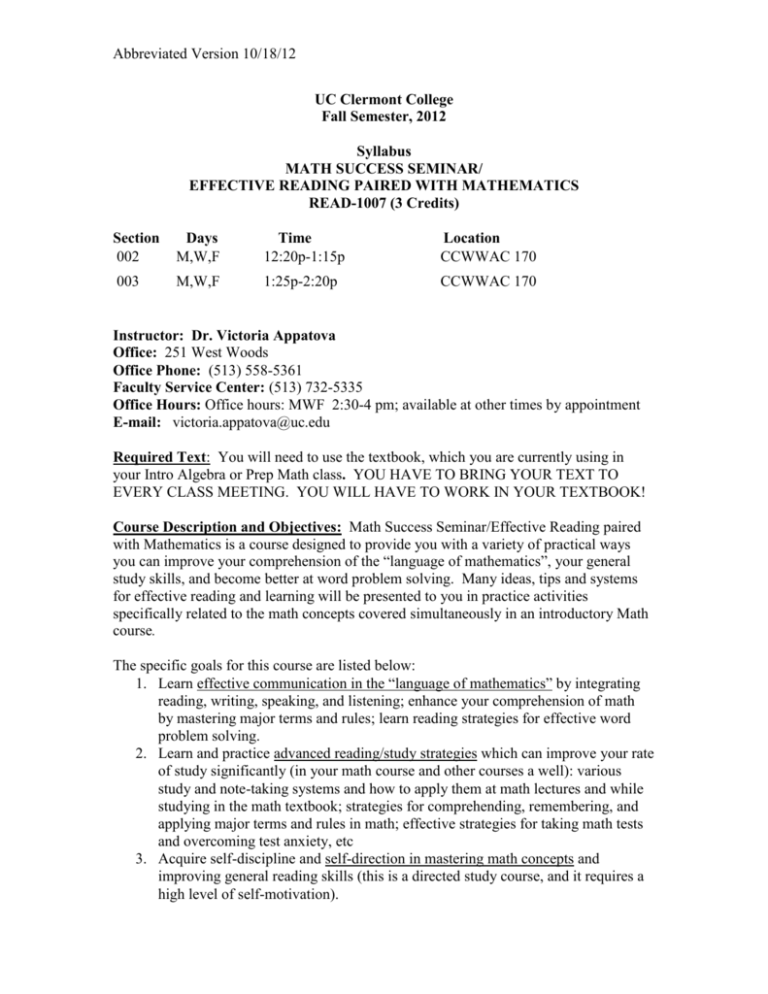
Abbreviated Version 10/18/12 UC Clermont College Fall Semester, 2012 Syllabus MATH SUCCESS SEMINAR/ EFFECTIVE READING PAIRED WITH MATHEMATICS READ-1007 (3 Credits) Section 002 Days M,W,F Time 12:20p-1:15p Location CCWWAC 170 003 M,W,F 1:25p-2:20p CCWWAC 170 Instructor: Dr. Victoria Appatova Office: 251 West Woods Office Phone: (513) 558-5361 Faculty Service Center: (513) 732-5335 Office Hours: Office hours: MWF 2:30-4 pm; available at other times by appointment E-mail: victoria.appatova@uc.edu Required Text: You will need to use the textbook, which you are currently using in your Intro Algebra or Prep Math class. YOU HAVE TO BRING YOUR TEXT TO EVERY CLASS MEETING. YOU WILL HAVE TO WORK IN YOUR TEXTBOOK! Course Description and Objectives: Math Success Seminar/Effective Reading paired with Mathematics is a course designed to provide you with a variety of practical ways you can improve your comprehension of the “language of mathematics”, your general study skills, and become better at word problem solving. Many ideas, tips and systems for effective reading and learning will be presented to you in practice activities specifically related to the math concepts covered simultaneously in an introductory Math course. The specific goals for this course are listed below: 1. Learn effective communication in the “language of mathematics” by integrating reading, writing, speaking, and listening; enhance your comprehension of math by mastering major terms and rules; learn reading strategies for effective word problem solving. 2. Learn and practice advanced reading/study strategies which can improve your rate of study significantly (in your math course and other courses a well): various study and note-taking systems and how to apply them at math lectures and while studying in the math textbook; strategies for comprehending, remembering, and applying major terms and rules in math; effective strategies for taking math tests and overcoming test anxiety, etc 3. Acquire self-discipline and self-direction in mastering math concepts and improving general reading skills (this is a directed study course, and it requires a high level of self-motivation). Abbreviated Version 10/18/12 Course Assignments: You will be required to do reading and writing assignments from your text and from other sources. Some of these assignments will be homework, and some will be in-class assignments. Some of the assignments will be individual and some will be group assignments. All reading and preparation from the text should be done in advance, as assigned by the Instructor. Assignments, activities, and exercises will have different point values depending on the scope of the assignment. You will work on various types of word problems throughout the quarter integrating reading, writing, and oral communication skills. At least once a quarter, you will have to do a peer teaching presentation (20 points) with the following reflection essay (20 points). Every week your instructor will introduce and explain some learning strategy and its purpose. You will practice this strategy in class (5 points). Your homework normally will be to apply the new strategy, which you have just learned, to a chapter in the math textbook, which you currently study in your math class (10 points). Friday will normally be a “Reflection Day”: we will discuss the effectiveness of different strategies as well as reflect on the process of learning the actual math material. We will evaluate how well the strategy worked for you and whether and how you needed to adapt it for your textbook chapter. We will also write Math Journals that will summarize our discussions (15 points). You will have to submit a portfolio of all Math Journals at the end of the quarter (do not throw them away!) You will get 50 points for a full portfolio of all journals and self-evaluation. There will be a final project (50 points). There will be no final exam because of the frequent class assignments, a major test at the end of the quarter, and a final project. Tentative Outline of Assignments: This outline is intended as a guide to the material we will work on each week during our class sessions and it may be modified. Be in class to receive updates. Week 1: Course Introduction; Exploring Course Syllabi; Textbook Preview Week 2: SQ3R Math Journal #1 (SQ3R) Translating Phrases and Sentences into Algebraic Expressions, Equations, and Inequalities Week 3: Word Problems (focus on Translating Skills); Math Journal #2 (Translating Skills) Week 4: Glossary of Terms and Rules: Paragraph and Table Formats of Note-Taking in Math Abbreviated Version 10/18/12 Word Problems (focus on Reading and Translating Percentages to Proportions and Equations); Math Journal #3 (Paragraph and Table Formats of Note-Taking) Week 5: Three Steps to Reading a Word Problem; Word Problems (focus on Assigning Variables; Increase/Decrease Problems) Math Journal #4 (Three Steps to Reading a Word Problem) Week 6: Highlighting and Marginal Notes; Word Problems (focus on Proportions) Math Journal #5 (Highlighting and Marginal Notes) Week 7: Test Taking Strategies; Cornell Note-Taking Modified for Math Notes Math Journal #6 (Cornell Note-Taking) Week 8: Outlining as a Tool for Summary Writing in Math Word Problems (focus on Mixture Problems) Math Journal #7 (Outlining as a Tool for Summary Writing) Week 9: Reading Charts, Pictures, and Graphs Word Problems (focus on Mixture Problems) Math Journal #8 (Charts, Pictures, and Graphs) Week 10: Concept Mapping in Math Word Problems (focus on Mixture Problems) Math Journal #9 (Concept Mapping) Weeks 11-13: Using Web Resources for Learning Math Concepts: Khan Academy Word Problems (focus on Mixture Problems) Math Journal #10 (Using Web Resources) Week 14: Journal Portfolio Work on Final projects Week 15: Final Projects and Presentations
